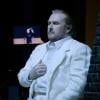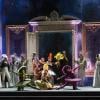
San Francisco Opera, led by General Director Matthew Shilvock and Music Director Eun Sun Kim, today announced its 103rd season, running September 2025 through June 2026. At a time of wars and misery abroad and corrosive division at home, Shilvock told SF Classical Voice:
“I am increasingly feeling the desire of the audience to go deep in experiences of shared meaning, particularly experiences that are emotional or spiritual at their core.
“The opera house is a sanctuary where we gather to share in what it means to be human, where we immerse ourselves in the emotional truths that connect us all.”
This is the season in brief:
Giuseppe Verdi’s Rigoletto kicks things off, Sept. 5–27, with Kim conducting and José Maria Condemi directing. The cast includes baritone Amartuvshin Enkhbat, tenor Giovanni Sala, soprano Adela Zaharia, mezzo-soprano J’Nai Bridges, and bass Peixin Chen.
Opera in the Park, scheduled for Sept. 7, rounds out opening weekend, with Kim conducting and soloists to be announced. The company is celebrating this fall as the 50th anniversary of the free annual concert in Golden Gate Park.

Jake Heggie’s Dead Man Walking follows, Sept. 14–28, the Bay Area composer’s very first opera returning to the company where it premiered 25 years ago. Patrick Summers conducts, and the production is by Leonard Foglia. In the cast: mezzo-soprano Jamie Barton, bass-baritone Ryan McKinny, mezzo-soprano Susan Graham, and soprano Brittany Renee.
Richard Wagner’s Parsifal, in a new production by Matthew Ozawa, is next, Oct. 25 – Nov. 13. Kim leads a cast that includes tenor Brandon Jovanovich, bass Kwangchul Youn, baritone Brian Mulligan, soprano Tanja Ariane Baumgartner, and bass-baritone Falk Struckmann.
For the second season in a row, a concert spotlighting the SF Opera Orchestra is on the fall schedule, Nov. 1, Kim conducting works by Beethoven and Manuel de Falla, with mezzo-soprano Daniela Mack soloing.
The world premiere of Huang Ruo’s The Monkey King, Nov. 14–30, concludes the fall season. The new work, with a libretto by David Henry Hwang, is set to be conducted by Carolyn Kuan and directed Diane Paulus. Starring are tenor Kang Wang, soprano Mei Gui Zhang, tenor Konu Kim, baritone Jusung Gabriel Park, bass Peixin Chen, baritone Joo Won Kang, and mezzo-soprano Hongni Wu.

Opening the summer season is Gioachino Rossini’s The Barber of Seville, May 28 – June 21, 2026, with Benjamin Manis conducting and production by Emilio Sagi. Two casts are set for nine performances.
Kim is back on the podium to conduct Richard Strauss’s Elektra, June 7–27, 2026. Anja Kühnhold directs, with soprano Elena Pankratova, mezzo-soprano Michaela Schuster, and soprano Elza van den Heever in the cast.
And just before closing night, SF Opera presents its second annual Pride Concert, June 26, 2026, details to be announced.
Subscription tickets are now on sale, available online and by phone at 415-864-3330.
The 2025–2026 season is Shilvock’s 10th as general director and his 20th year with the company since he arrived from Houston Grand Opera, where he had been assistant to David Gockley, SF Opera’s general director from 2006 to 2016.
Shilvock saw the company through serious pre-pandemic fiscal problems and then the devastation of COVID-19. The challenges show no sign of abating, but Shilvock, as usual, is positive and optimistic.

Shilvock highlighted some of the significant productions among the upcoming season’s offerings:
“A new Parsifal is a major undertaking for any opera company. [And] with The Monkey King and Dead Man Walking, we celebrate the company’s historic commitment to storytelling that makes a difference. The whole season is filled with artistry that affirms the Bay Area as one of the great cultural centers of the world. I’m very excited for what lies ahead.”
Kim has a busy schedule in 2025–2026, continuing her Verdi-Wagner initiative of conducting one opera by each composer every year, among other projects. Of the upcoming season, she said:
“Several of opera’s great masterpieces make up our 2025–2026 season. The opener, Rigoletto, was considered by Verdi himself to be his best opera, and Parsifal returns to our stage for the first time in 25 years.
“Elektra marks a transition for Richard Strauss from the melodic language in his early tone poems to an expansive instrumentation of vast harmonic possibility. The opera is so demanding, especially for the singers, and I am very happy to be conducting this first Elektra of my career with my orchestra and such a wonderful cast.”

Kim continued: “The SF Opera Orchestra and I customarily work together in the orchestra pit, but these musicians, due to their vast experience, can also command the stage. In our fall concert, the orchestra will do just that in Beethoven’s Fifth Symphony. We will also perform music by Manuel de Falla, who, across national and language barriers, absorbed Beethoven’s influence, even citing the famous ‘fate’ motif from the Fifth Symphony in his ballet [The Three-Cornered Hat]. Falla’s lovely song cycle [Seven Spanish Folk Songs] will feature the beautiful voice of Daniela Mack.”
SF Opera’s current operating budget, Shilvock told SFCV, is $87 million, against last season’s $91 million. Since the pandemic, the company’s annual operating budget — which largely determines how adventurous programming and casting can be — has varied widely.
The 2020–2021 budget plunged to $44 million, almost half of what the administration had counted on, before rising back to $78.5 million for 2021–2022. Shilvock considers the standard budget for an eight-opera season to be “in the mid $90 millions.” The company’s centennial season (2022–2023) and 101st season (2023–2024) were at that level. But a subsequent drop in revenue, along with rising expenses, led the 2024–2025 season to comprise just six productions.

In spite of increasing attendance at the War Memorial, revenue from ticket sales, which in the 1970s would have accounted for 60 percent of the company’s income, today contributes only 14 percent.
Asked about the current decrease in already meager government support, Shilvock says he expects no improvement in federal, state, or city funding, which is “less than one-half of 1 percent of the budget.”
From federal agencies, such as the National Endowment for the Arts, SF Opera receives about $70,000 annually, and the future of the NEA looks dismal. President Donald Trump’s new administration has ordered a pause on all federal grants, which could wipe out funding for hundreds of thousands of nonprofit arts organizations. (The freeze is intended to allow federal agencies to check that all grants are consistent with the president’s policies.)
State support for SF Opera has been zero, and city support has historically come from the hotel tax-supported Grants for the Arts. San Francisco’s new mayor, Daniel Lurie, has a “deep appreciation for the arts,” Shilvock said, but the city has a budget shortfall of $876 million over the next two years, prompting city departments to plan for 15 percent cuts in spending across the board.
The big question — to which neither Shilvock nor any leader in the arts has a simple answer — is why, at a time when the stock market is skyrocketing and tech billionaires are everywhere, individual donations have risen slowly, if at all. The current total of individual and corporation donations to SF Opera is $42 million, and Shilvock spoke of “amazing audience energy” and his hope for increased donations.
Against fiscal challenges, labor disputes, and possible international travel restrictions for guest artists (if 2017 is anything to go on), SF Opera administration has managed to extend Kim’s contract as music director, put together an impressive new season, and reach a temporary settlement with its orchestra (through May 30, just before the company’s 2025 summer season begins on June 3).




